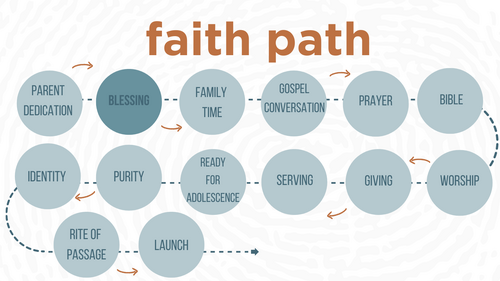Blessing: Age 3
Affirm your child's value

What is the Blessing step?
Around the age of three is a great time to establish the habit of praying for and giving a blessing to your child, which is the second step on the Faith Path. The word “bless” or “blessing” is used almost seven hundred times in Scripture, and we see examples throughout of parents blessing their children. Ephesians also reminds us that our God is a God of blessing: “Praise be to the God and Father of our Lord Jesus Christ, who has blessed us in the heavenly realms with every spiritual blessing in Christ.” (Ephesians 1:3)
We receive a blessing from our Heavenly Father and have the wonderful opportunity to pass it on to our children, communicating the unconditional love, affirmation, and acceptance every child needs from their parents.
We receive a blessing from our Heavenly Father and have the wonderful opportunity to pass it on to our children, communicating the unconditional love, affirmation, and acceptance every child needs from their parents.
Put it into practice
Here are five basic elements of the blessing that, combined, have tremendous impact (using the acronym BLESS):
- Be committed: The blessing is not a fleeting moment or mere symbolic event. It includes an active, long-term commitment to the child’s well-being by accepting responsibility to help them become all God intends.
- Lovingly vouch: The power of a hug or placing your hand on your child while affirming him or her creates an important physical connection and communicates warmth, acceptance, and relational health.
- Express value: Just like we add value to someone’s pocket by handing them a coin, we add to a child’s life when we use words that attach high value to them as a person.
- See potential: Parents are best positioned to see a child’s natural strengths and foresee possibilities for their future. Giving the blessing includes picturing a special future and cheering them toward achieving their potential.
- Say it: An effective blessing must be put into words, whether spoken, written, or both. Simply being present is not enough to communicate the blessing. Words of affirmation are necessary for the child to know he or she is appreciated and accepted.
Next Steps
You can take advantage of special occasions and scheduled events to give the blessing in an intentional manner as well as capture informal, more spontaneous moments. You might want to start a nightly routine of blessing before bedtime, or as you drop your child off at school or daycare.
- On-the-go Blessings: Speak words of blessing to your child while driving to school, tucking into bed, celebrating an accomplishment or good effort, or writing a note to place in their lunch. You can also use a dry-erase marker on your child’s mirror to complete an affirming phrase such as “You are great because....”. Here are some other examples of affirming phrases you can say to your child:
- “I was so proud of you when I saw you…”
- “I think God is going to use you in the future to…”
- “God has gifted you with a unique ability to…”
- Bedtime Blessing Prayer: Select a special Scripture to pray over your child each evening, such as “The Lord bless you and keep you; the Lord make his face to shine upon you and be gracious to you; the Lord lift up his countenance upon you and give you peace." (Numbers 6:24-26)
- Consider framing the verse to keep beside your child’s bed. Lay your hand gently on your child’s head, arm, or shoulder while praying to reassure him/her with a loving touch. Some other examples of blessing from Scripture include 1 Thessalonians 3:11-13, 5:23; 2 Thessalonians 3:5, and Hebrews 13:20-21.
Additional Resources
- The Blessing by Gary Smalley and John Trent
- A Father's Guide to Blessing His Children by David Michael
- The Power of a Praying Parent by Stormie Omartian
- Bedtime Blessings by John Trent
- Praying the Scriptures for Your Children by Jodie Berndt
- Bedtime Blessings for Your Baby by Dayspring
- Take Back Your Family from the Tyranny of Busy by Jefferson Bethky
